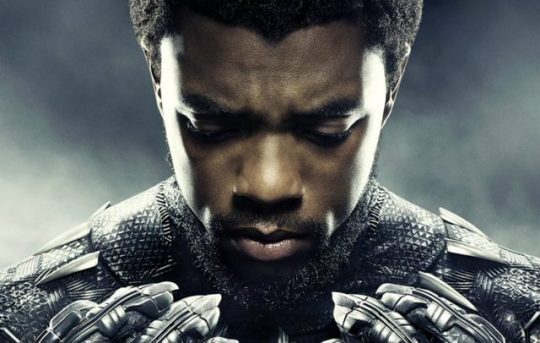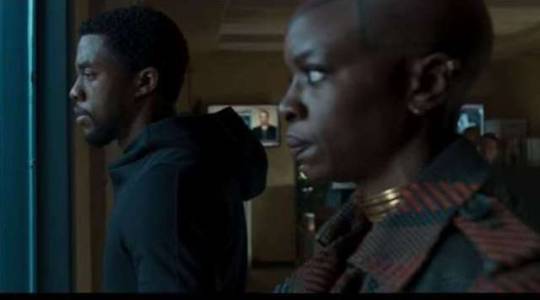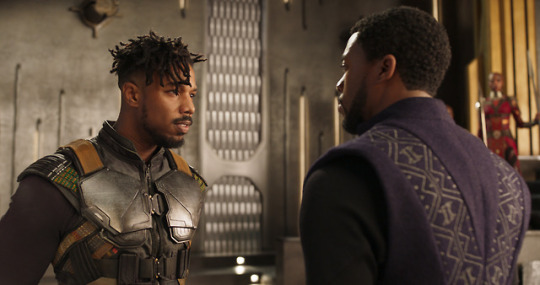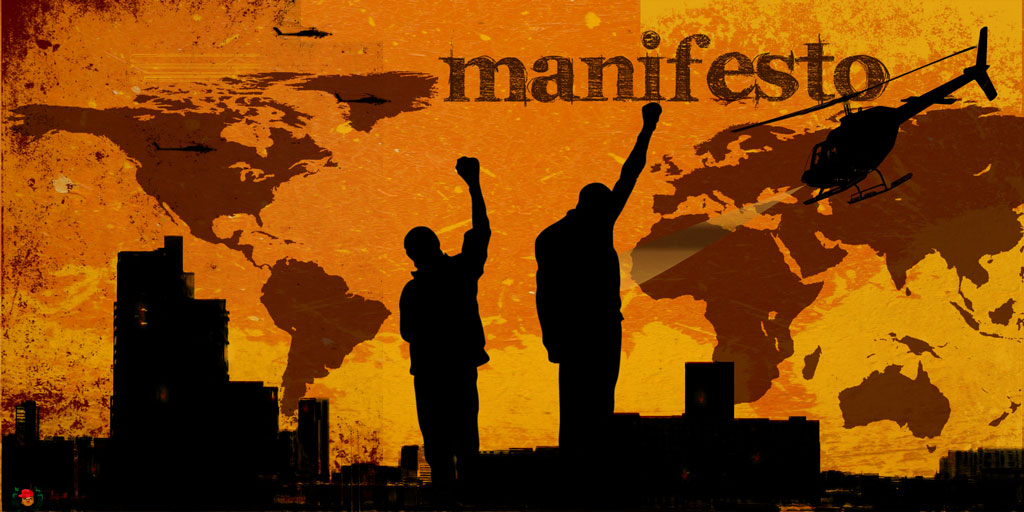We Have Always Been Wakanda - Chris "Preach" Smith
 Friday, February 23, 2018 at 11:18AM
Friday, February 23, 2018 at 11:18AM  Photo Credit: NME
Photo Credit: NME
"Image sees, image feels, image acts."
- Lerone Bennett Jr.
It has been exactly one week since I got myself together and made my
way to my local movie theater in order to catch Marvel Studios' latest
offering in the superhero movie genre, Black Panther. It was a moment
that many had been anticipating for well over a year. As I sat in the theater
and saw the opening scene unfold, with Sterling K. Brown telling the story
of how Wakanda and the Black Panther came to be, I felt the welling of
tears in my eyes. These were tears of joy. Tears of pride. And, tears of
relief. I wasn't alone - I could see a few others dab at the corners
of their eyes as the scene where T'Challa, Nakia and Okoye returned to
their home of Wakanda unfolded. This co-mingling of emotions surged
and bubbled well after I left the theater. I walked out and saw a young
girl with her parents. She looked at me and gave me the Wakandan salute.
I returned it, and we all smiled.
And that moment began to underscore what Black Panther has become for
me and many others who've watched the film. Because we have always
been Wakanda.  T'Challa(Chadwick Boseman) and Okoye(Danai Gunira) stand on guard. Photo Credit:
T'Challa(Chadwick Boseman) and Okoye(Danai Gunira) stand on guard. Photo Credit:
GistPartners
There are quite a few articles and syllabi that have been published in the past
week and prior to that on the impact that this film will have on Black people
across the diaspora. And there will be more to come. For me, this film directed
by Ryan Coogler (only his third motion picture if you can believe it) is definitively
the crowning achievement of Marvel Studios but a watershed moment for Black
cinematic history as the bold next step our films will take in conveying our stories
across the board. Yeah, I've seen the pushback from bigots who want to pop up
whenever there's something positive for Black people. "Oh, Wakanda isn't real."
It's a funny statement to issue when you have people dressing as Pokemon
characters or those people who create Quidditch leagues in parks with brooms and
black lab coats yearning to be part of Hogwarts. Even more so when you consider
there are actual courses where one can learn the Klingon language from Star Trek.
Image, and the energy it generates, matters. And with this film, there are so many
images and layers that enhance this film's power. I honestly feel like there'll be
a lot to unpack from this movie for the entire year.
I direct you back to the quote above that opened this article, words credited to
one of Black America's most foremost historians who passed away a day before
the film opened. Lerone Bennett Jr. was someone who would've understood the
power behind Black Panther and what it took to make this film, being someone
who began to piece together the true history of his people back in his home state
of Mississippi at a time when Black people on the big screen were relegated to being
shiftless scoundrels. One has to remember that the highest grossing movie in this
country that made the motion picture industry here take hold, a film that is still taught
as part of university curriculum is The Birth of a Nation by D.W. Griffith. The film
became a flashpoint of high racial tensions in America, with whites flocking to the
theater to see Black people depicted as lazy and over-sexed savages in the years
after the Civil War. It is forever tied to the revival of the terrorist organization of
the Ku Klux Klan, a revival spurred by an Alabama schoolteacher who saw the film.
The film was also part of a spark that led to the strengthening of a civil rights movement
in this nation due in part to the activist and journalist William Monroe Trotter leading
efforts to have the film banned in Boston, Massachusetts. From that point there has
been a concerted struggle for Black people to be represented well and have their
stories told in a way that isn't demeaning. From the body of work of Oscar Michaux
to the prominence of acting talent such as Paul Robeson, Canada Lee, Sidney Poitier,
Cicely Tyson, Nichelle Nichols and many others on the big screen and the TV screen
to now, that has been a journey that has lifted us up and made us proud. Seeing
yourself in a powerful way in a story that's compelling and opposite of a negative
narrative that the powers that be put you and those who look like you in is something
that can never be dismissed given the history of the United States and in turn, the
Western world. Image matters, even in moments when you think it does not. Image
can become a prison as much as it can be a throne seat.
 Erik Killmonger (Michael B. Jordan) confronts T'Challa(Boseman). Photo Credit: Marvel Studios
Erik Killmonger (Michael B. Jordan) confronts T'Challa(Boseman). Photo Credit: Marvel Studios
And so Black Panther enters the stage with the weight of all of this history on its
shoulders, and it more than meets the challenge. Think about this - an acclaimed rising
actor in Chadwick Boseman who hails from South Carolina playing T'Challa. Lupita
Nyong'o as the spy and love of T'Challa, Nakia who hails from Kenya. Michael B. Jordan,
who plays the villainous Erik Killmonger being an American. Danai Gunira as Okoye
being of Zimbabwean descent. This film is a woven blanket of the diaspora brought
forth beautifully by Coogler, an Oakland, California native who no doubt went into this
film having his thoughts dwell on the Black cinematic history he was set to advance.
There's been many written pieces on how he wove the resistance history of the Black
Panther Party into the film, with the revolutionary struggle represented in Jordan's
intense portrayal of Killmonger who sought Wakanda's resources to take over the world
and arrived at the kingdom through treachery and murder in order to reconnect to his
past through his exiled father, N'Jobu. I do feel that Coogler also took pains to glean/
influence from one of the great Paul Robeson's few motion picture appearances, Song Of
Freedom in 1936. That film, made in the United Kingdom featured Robeson as a dockhand
in London who yearns to find out where he comes from in the African continent, spurred
on by a melody he sings often and a necklace handed down to him. This leads to him
being discovered by a opera maestro and in turn, leads him back to the African nation
that he is a rightful heir to the throne of - but not without severe resistance. Seeing
Killmonger and his actions on the screen to me is an illustration of the complexity of the
relationship between African-Americans and African people from the nations on the continent
and also of the toxic elements of masculinity coupled with the revolutionary ethos that
is still playing out today. Especially when it comes to the traces of misogynoir present in
Killmonger's character which also has been a point of serious discussion.
The sheer solidarity that you feel on the screen with T'Challa and the women of Wakanda which
include his mother, Ramonda (played by Angela Bassett) and sister Shuri (played by
Letitia Wright) is at times electric, and ultimately nurturing and unbreakable. As I sat
in the theater for a second time seeing the movie with my mom and two of my sisters
and brother, I felt that bond reflected in my own with my family. I saw that same feeling
reflected in the sheer amount of families in the theater. In the line that stretched outside
of the lobby doors waiting for the next showing. My mother turned to me after the film
and said with pride, "this has to be the best film I've seen in a long time. And I can't
wait to see it again." To me, the women of Wakanda are in this film the realization and
the homage to many women of the diaspora who have helped to uplift Black people
throughout the centuries. The Dahomey Amazons and Queen Nzinga, to name a few. And
I saw T'Challa in essence represent those Black men who recognized, honored and embraced
the role of sisters in the fight like Thomas Sankara and Fred Hampton for example. And
one can't discount the women behind the scenes such as Hannah Bechler and Ruth E.
Carter who helped to fully hone the Afrofuturistic splendor of Wakanda and its citizens.
In a time where you have a virulent racist in the Oval Office and a cross-section of the
country who are tuned in to him as if they were a hive mind of hate, a film like Black
Panther matters. It matters because it ups the ante in what Black storytellers can present
to the world and their people. The film is on track to make a BILLION dollars at the box office
at its current rate (as of today it has officially topped $500 million). Ryan Coogler is in
that pantheon now along with Ava DuVernay (who is set to be next with her film for Disney,
A Wrinkle In Time opening in two weeks), Jordan Peele and Barry Jenkins who are expanding
the cinematic perspective of Black people in different ways. Black Panther is a glorious next
step that should be rightly celebrated. And hopefully added on to by other films that can
build upon its greatness because all this is, is a reaffirmation of how great we as a people
have always been. And that image is one to hold onto, fiercely.
Wakanda Forever.


